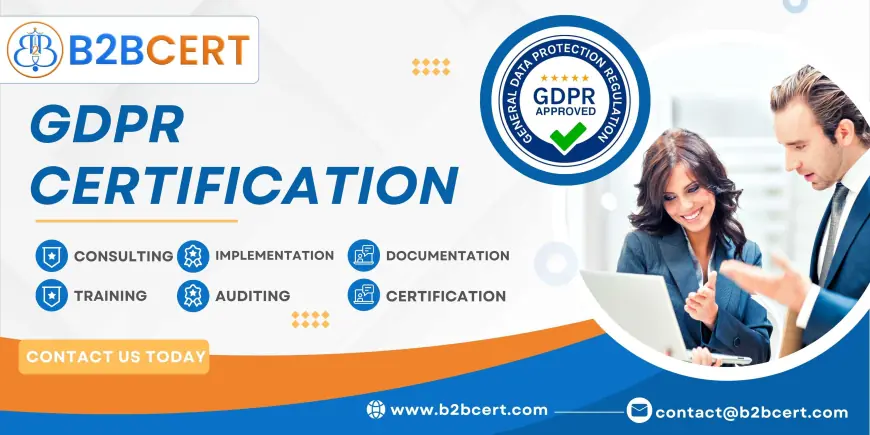GDPR Certification: A Comprehensive Guide
GDPR Certification in Bahrain ensures businesses comply with the European Union's General Data Protection Regulation (GDPR) requirements when handling EU citizens' data. With the country's focus on digital transformation and data privacy, organizations can align GDPR compliance with Bahrain's Personal Data Protection Law (PDPL). Through professional services like readiness assessments, policy development, and expert consultants, businesses in Bahrain can achieve robust data protection, mitigate risks, and enhance trust with global stakeholders.

ISO 45001 is the internationally recognized standard for occupational health and safety (OH&S) management systems. Its primary goal is to enhance workplace safety, reduce risks, and improve employee well-being. For businesses in South Africa, achieving ISO 45001 certification demonstrates a commitment to fostering a safe and healthy working environment while complying with legal and ethical responsibilities.
This blog will provide insights into ISO 45001 Certification in South Africa, implementation, services, and the role of consultants in helping businesses achieve certification.
ISO 45001 Implementation in South Africa
Implementing ISO 45001 in South Africa requires a structured approach tailored to the unique challenges and industries prevalent in the region. With sectors like mining, manufacturing, construction, and agriculture being critical to South Africa’s economy, the risks to occupational health and safety are diverse and complex. Here’s how organizations can effectively implement ISO 45001:
Understanding Legal Compliance: South Africa has stringent OH&S regulations, including the Occupational Health and Safety Act (No. 85 of 1993). Businesses must align their safety practices with both local legislation and ISO 45001 requirements to achieve certification.
Engaging Stakeholders: Successful implementation begins with strong leadership commitment. Engaging employees, contractors, and other stakeholders ensures an inclusive approach to workplace safety. This engagement also helps identify hazards specific to various operations.
Gap Analysis: Conducting a gap analysis is crucial for understanding the current state of the organization’s safety management system. This step helps identify areas that need improvement to comply with ISO 45001.
Risk Management: A cornerstone of ISO 45001 is identifying potential hazards and implementing preventive measures. Organizations in South Africa can leverage the standard to address risks specific to their industries, such as mining accidents, construction site hazards, and exposure to harmful substances.
Continuous Improvement: ISO 45001 Implementation in Bangalore promotes a culture of continuous improvement by monitoring and evaluating safety performance. This aligns with global best practices, ensuring businesses remain competitive and resilient.
ISO 45001 Services in South Africa
Several organizations in South Africa provide comprehensive services to facilitate ISO 45001 certification. These services are essential for businesses seeking streamlined implementation and certification processes.
Training and Workshops: Accredited training providers in South Africa offer courses on ISO 45001 requirements, internal auditing, and implementation strategies. These programs equip employees and managers with the necessary skills to build an effective OH&S management system.
Documentation Support: Developing and maintaining proper documentation is critical for ISO 45001 compliance. Service providers assist with creating manuals, policies, procedures, and risk assessment documents tailored to the organization’s needs.
Auditing Services: Internal and external audits play a vital role in the certification process. Third-party auditing services help identify non-conformities and ensure readiness for the final certification audit.
Certification Assistance: South African certification bodies, accredited by entities such as SANAS (South African National Accreditation System), conduct audits and issue ISO 45001 Services in Bahrain. Partnering with these bodies ensures a credible and recognized certification.
ISO 45001 Consultants in South Africa
ISO 45001 consultants play an instrumental role in guiding organizations through the complexities of achieving certification. Their expertise ensures a smoother and more efficient process.
Tailored Solutions: Consultants assess the organization’s specific needs and customize implementation plans accordingly. For South African businesses, this often involves addressing risks unique to industries like mining, agriculture, and construction.
Compliance Expertise: ISO 45001 consultants possess in-depth knowledge of local and international OH&S regulations. This ensures that organizations meet both ISO standards and South African legal requirements.
Project Management: From initial assessments to the final certification audit, consultants oversee the entire process. Their project management skills minimize disruptions to day-to-day operations while keeping the certification journey on track.
Continuous Support: Beyond certification, consultants provide ongoing support to help organizations maintain compliance and improve their OH&S management systems. This includes periodic reviews, risk assessments, and training updates.
Conclusion
ISO 45001 Registration in Uganda is a vital step for businesses aiming to create safer workplaces, enhance operational efficiency, and demonstrate social responsibility. The implementation process, coupled with the support of specialized services and expert consultants, ensures a seamless transition to a world-class OH&S management system.
By investing in ISO 45001 certification, organizations in South Africa not only comply with legal obligations but also position themselves as leaders in workplace safety and employee welfare. Whether you’re starting the journey or looking to maintain compliance, leveraging professional services and consultants is key to achieving long-term success.












